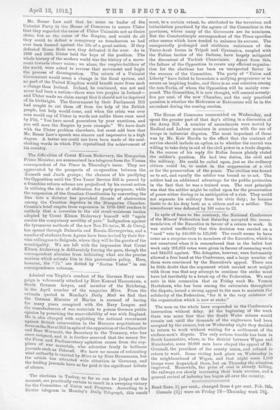The House of Commons reassembled on Wednesday, and spent the
greater part of that day's sitting in a discussion of the Army Bill. A number of amendments were moved by Radical and Labour members in connexion with the use of troops in industrial disputes. The most important of these was by Mr. Keir Hardie to the effect that the contract of service should include an option as to whether the recruit was willing to take duty in aid of the civil power in a trade dispute. In the course of his reply Sir Rufus Isaacs plainly stated the soldier's position. Ho had two duties, the civil and the military. He could be called upon, just as the ordinary citizen could be, to assist in the suppression of a riot or for the preservation of the peace. The civilian was bound so to act, and equally the soldier was bound so to act. The soldier had an additional advantage for the public protection in the fact that he was a trained man. The root principle was that the soldier might be called upon for the preservation of peace either during or in anticipation of a riot. They could not separate his military from his civic duty ; he became liable to do his duty both as a citizen and as a soldier. The amendment was defeated by 168 votes to 23.






































 Previous page
Previous page